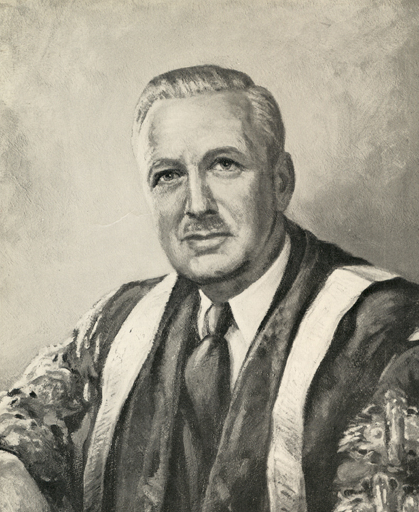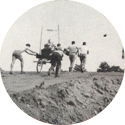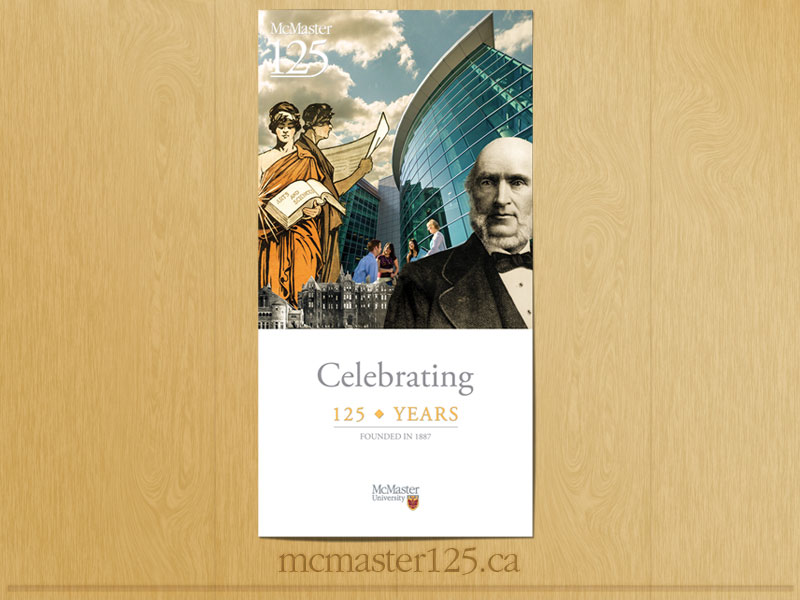George Peel Gilmour

A Daughter Recalls her father, George Gilmour ’21
by Gwen Laurie ’54
…I am very biased in my view of George Gilmour, and think that he was one of God’s finest creations. I am sure that not everybody liked him, but I am equally sure that all respected him, and any loved him. …Of course, as a child, I thought everybody had a wonderful father just as I had. …It was only when I grew up that I realized how fortunate we were.
The private man was all that the public man was, and more. He was a shy man whose home meant a great deal to him: ours was a home where he always made life not only interesting, but fun. He was often worried and discouraged, particularly as he guided the University through its change from denominational status to its present structure, but he didn’t show this side to his children. In fact, he didn’t talk about any important University business at home –we had to read it in the newspapers.
One of my early memories of dad was job–oriented: at the age of three, I remember one spring Saturday he left the house to marry Betty Jones…. I got very concerned, because he was already married to mother, and had two children. I was very relieved when he came home. This happened several weeks in a row, and every time he came home, so I stopped worrying. Eventually, I realized that he was not going off to be married, but to do the marrying.
He loved his children, but I have the feeling that young children, as a species, were not his forte. He used to tell me not to expect his friends to remember my name, because he couldn’t remember the names of his friends’ children. He certainly did not care for children’s parties –these were left to mother’s charge. He was heard once to describe hell as a continuous children’s party.
His facility for words and his turns of phrase were known to all of you who heard him speak. On phrase I am sure many of you will remember was one he used when he wanted to refer to something he thought you should know but probably didn’t. He would preface a remark with, “As you will recall from your general reading.”
[At home, there were other ones.] I recall: “Gwen, don’t bathe in your food.” Another was, “A tidy body bespeaks a tidy mind.” This latter phrase caused me no end of trouble: I could never study in jeans and sloppy clothes, as all the other students did. I had to put on my stockings and suit to go to the library. (He practiced what he preached, because he always worked at his desk in shirt and tie, and usually a jacket.)
I remember him often saying that serious things must be taken with a great deal of humour. One of his students told mother the following incident which took place soon after the University moved to Hamilton. The Silhouette came out just before dad’s religious studies class. Several of the young men would pick up their copies, open them, and proceed to read during class…. Unable to endure the situation any longer, dad took action: “You will recall from your general reading the incident in the book of Matthew when Jesus was teaching and healing at a house in Capurnum. They took the tiles off the roof, and lowered a paralyzed man into the room where Jesus was.” At this point, his voice rose as he quoted, “And they could not come nigh unto him because of the press.” That was the last time The Sil was read during G.P.’s lecture.
As many of you will know, George Gilmour loved to sing. At chapel service you certainly knew he was there; even walking by outside, you could hear him walking by outside, you could hear him if the windows were open, and you could tell he enjoyed singing. …Dad taught me to love Gilbert and Sullivan by taking me for years to the student productions. I’m sure one of the reasons I wanted to go to McMaster was to sing in the Gilbert and Sullivan operettas… Dad used to sing at home and on car trips, usually hymns. If he was in an expansive mood and among family, he would sometimes regale us with the old songs, …sometimes even some old temperance songs. …Part of the reason I think I remember them is that he had so much fun singing them.
Dad loved fun, and secretly loved student pranks –if they were clever ones. He thought people should know that fun is fun, and to hell with nonsense. I heard him say if there wasn’t some of the rebel in students at 20, they would be very dull by the time they were 40. He had no patience with those who threw red paint over the stones at the entrance to the University Hall, but he enjoyed the students who, at the height of the McCarthy era, climbed up the roof of University Hall to get to the flag staff and raise a large hammer and sickle flag. (He himself must have been involved in a number of pranks as a student: we have a picture at home of dad and Harold Lang, ’19, as students involved in an elaborate funeral for a deceased canary.)
…I have a very vivid memory of the first Christmas that dad was president (or, I should say, chancellor in those days). It was during the war, and the president’s house was used as a women’s residence; we lived on Forsyth Place. One Sunday morning, very, very early, mum and dad wakened my sister, Marnie, and me, and took us to their bedroom window. They had been awakened by singing. There in the dark, carrying candles in broken Coke bottles, were the seniors from Wallingford. We had not known of this carolling custom. It seemed like a fairyland –what with the darkness, the snow, the candles, the music –like the magic of the caroling of the field mice in Wind in the Willows. Mother invited the unexpected guests for coffee and cocoa and whatever we could find, and the singing continued inside. The carolers came every year, but after the first year, mother was prepared with coffee and donuts. It was fun, but nothing could ever match that first unexpected magical scene. I treasure many memories of experiences like that one which happened to us because of dad’s position.
- I remember filling his office floor with graduation diplomas. He would sign them with a fountain pen, and I would put them in order on the floor to dry. When the office was filled, I continued into the outer office.
- I remember meeting…many interesting guests. I remember particularly Mrs. Pandit, who…was giving the Whidden Lectures. Mother, who was looking after her, one day asked if she would excuse her for a few minutes. Mother told her that I was sick, and that she would like to drop in and check that I was all right. Mrs. Pandit looked wistfully at mother, and asked if she could come too. She said she had been away from home a long time, and was homesick for her daughters. They came and had tea in my bedroom… When she returned to India, Mrs. Pandit sent me a beautiful red and gold silk stole, which I still treasure.
- I remember dad saying that it took much less time to get the board of governors to authorize the building of a nuclear reactor than a university residence, because nobody knew about reactors and had to accept professional advice, but everyone was an expert on washrooms, and had to have his say…
- I remember the night there was a break–in at the president’s house. It happened during a brief time when there was a live–in housekeeper…. She wakened one night about two o’clock with a man standing in the doorway of her room. Mum and dad had been out when she went to bed, and she didn’t know if they were home, but with great presence of mind, she said, ’You will want to speak to Dr. Gilmour.” She led him up to his bedroom door, knocked, and said, ’Dr. Gilmour, there is a man here to see you. Dad came to the door, said, “I will see you in my study,” and took the man downstairs –while mother phoned the police. The police came, and found a companion in the bushes outside. They were escapees from the Guelph reformatory.
- I remember when the temporary buildings were being put up, and dad had great fears that they would not be very temporary. He said he hated the idea of being remembered as the builder of a wooden university.
- I remember the big snow storm of 1945, when everything was stopped for days. It began snowing one night, and dad and mother, who had been to Toronto, came home late. But during the night the snow fell more heavily still, and by morning everything was buried. Because of the late night, dad overslept; he didn”t hear the radio, and he hadn’t looked outdoors, when the phone rang. A student asked if the University was open. The reply was a sleepy growl, “Of course, it is; why wouldn’t it be?”
- I remember when dad was working at his desk at the president’s house the first week of classes. He heard the front door open, and someone came in. He went into the hall to find a very confused freshman who said, “Is this the Rec Hut? The sophs told me it was down here.“ Dad said he deliberately didn’t look closely at the student so he wouldn’t know who it was, but I always thought the poor student didn’t know this, and must have been embarrassed to pass him on campus; the sophomores who set him up must have had a good laugh.
- I remember dad’s retirement party was held in Wentworth House. It was a lovely warm September evening, and I was standing on the balcony talking to Hamilton’s mayor, Lloyd Jackson. McMaster’s first piece of outdoor sculpture was still relatively new, and was located near the trees bordering Forsythe Avenue, behind Wentworth House. The white female figure was known to students as “mother,” and the shrubbery around her had not yet grown. While chatting, I pointed to the statue, and made some reference to “mother.” The mayor was shocked, and with great indignation said, “Gwen, that doesn’t look a bit like your mother.”
I cannot talk about my father without mentioning my mother. In today’s parlance, she would be called an enabler. Without her, dad would not have been able to accomplish all that he did. She provided the home atmosphere where he could be refreshed and renewed. She has a serenity and a wisdom that was what he needed, and she has great generosity of spirit. Dad knew that she would always be there to help him, or anyone who needed help…
…Dad had the ability to see all sides of a problem and all points of view, and said that the hardest decisions in life were not between good and bad, but between better and best. At one point he was approached to see if he was interested in going to a large church in New York. He had no hesitation: he knew that for him “best” was staying here, and devoting his life to McMaster and the Baptist Convention of Ontario and Quebec. I’m sure that decision was best for …McMaster, which he guided through a period of great change…
I’m sure it was best, as well, for the family. He said he didn’t want to raise his daughters in New York City. He wanted his family around him. He was criticized for not sending us as boarders to Moulton College of Toronto, the girls’ school founded by Mrs. McMaster, but he said he wanted to raise his children himself, and not have someone else do it. …George Gilmour gave his children a marvelous gift of love, respect, and the feeling that we were very worthwhile human beings.
I am sure that all of us who have had happy childhoods would not have wanted to change our dad for any other, but I am very grateful that George Gilmour was the father in my “life with father.”





